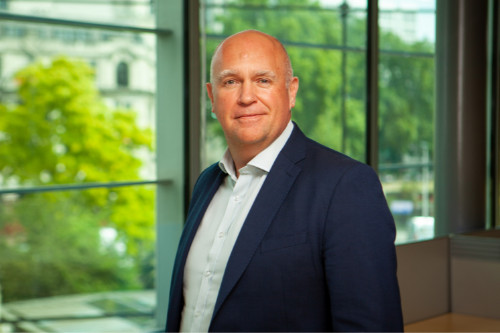

Part of what has made the COVID-19 crisis so unusual has been that it has posed such similar challenges at the same time for just about every industry across the global economy. However, John Stephenson (pictured), country manager for Victor Insurance in the UK, noted that it is that particular dynamic that has also enabled certain companies and managers to excel during the pandemic and transform challenges into opportunities.
For a lot of businesses, the last 18 months or so have created an opportunity to genuinely deliver on what their vision entails. Everyone would prefer it not to be under these circumstances, he said, but it is when you have a fundamental belief in what you’re trying to achieve and you’re faced with an opportunity to put that belief into action, that the mettle of a strong business shines through.
“We felt very strongly that we are all in this together and that we had to look after that end customer,” he said. “We knew that was not going to be straightforward, that we’d have to adapt and be a bit more flexible about how we approach [certain] things. Because in times of distress or danger, people generally do turn to the insurance industry one way or another - which has meant it was so important that we were all able to respond and collaborate, to do what needed to be done.”
Stephenson may have spent the bulk of his career to date in insurance broking but he has been on Victor Insurance UK’s growth journey since its inception. He was only months into his new role heading up the business when COVID struck. It has been something of a baptism of fire, he said, but the reality is that times of crisis can act as something of an accelerator for strategic change.
When COVID first occurred, the big challenge was the loss of connection the crisis created, he said - it can be easy for a firm to lose its core values, particularly those centred around collaboration and innovation if they aren’t protected. The answer for Stephenson and his team was to increase communication and staff support from a very early stage, something that was aided by technology.
“But actually, the technology is just part of that - it’s also about how you use it,” he said. “So we structured regular check-ins with the teams [and it got] to the point that we were actually more connected than we’d ever been before in terms of the frequency and probably the quality of contact as well, because there was such a conscious effort to make sure our connections were worthwhile. That made a real difference, and our level of communication has been maintained at a high level, which will continue even now as things do return to ‘normal’.”
That technology-based connectivity has been a real boon for the team internally, Stephenson said, but it has also been great for the business more generally as it has allowed the firm to continue to develop and maintain strong relationships across their geographic reach. Going forward, a blend of technology-driven and face-to-face interaction will be utilised, which he is confident will result in both a stronger team and healthier external relationships.
Read more: Victor Insurance Holdings introduces new CEO
From an operational standpoint, COVID came with its difficulties as the firm had to shift to remote work while maintaining its service proposition but Stephenson highlighted that Victor was fortunate as it had already made significant investments in its digital platforms. Given its business resilience planning and already established remote working capability, it was a smooth transition.
“And the key thing about that was not only could colleagues stay connected on a single platform with access to all the tools and information that they needed,” he said, “it also meant that our brokers could access us and that we maintained an online presence for them while they were going through similar if not greater challenges themselves.
“We deal with brokers of all sizes, from different parts of the country, both generalist and specialist, so we know not everybody has the same capabilities or dependences… We felt we needed to be there for them when they needed us, our products, our devices – and that we needed to make that as easy as we could during what was, especially in its early stages, a confusing and uncertain period.”
Looking at the tripartite relationship between carriers, MGAs and brokers, he highlighted how the COVID crisis had accentuated the need for strong relationships between all parties and that the word that underpins such relationships is ‘trust’. Looking to the trust and confidence that carriers have had in Victor to be agile and respond to COVID and the faith that brokers have placed in the firm maintaining its value proposition during a time of global upheaval has only cemented that for Stephenson.
“I think those relationships undoubtedly strengthened,” he said, “and strong relationships only got stronger, because of the collaboration going on during COVID. But we also found that we entered into a lot of new relationships during that period, because brokers were looking for that security, and that certainty, which we were able to provide for them.
“I’m sure that as we look forward and come out the other side, those relationships will last a long time because they’ve gone through the ultimate stress test. And you learn a lot about the partners you work with in periods of stress… The strength of these relationships, the level of trust and the transparency – the willingness to make compromises and the acceptance of circumstances – I think a combination of that has meant that UK SMEs and Plcs got the service they needed and rightfully expected at that time.”
